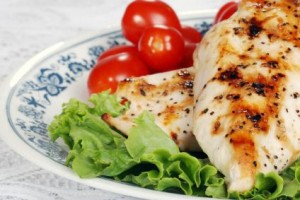In the past, I have not shared my written opinions about eating for performance because my dietary guidlines are tailored to my own body and my current knowledge about sports nutrition. But because I was asked and answered this question recently for Paul Korankye, (remember the Hidden Stars Skaters Dream Club in Ghana?), I decided to risk a possible blog backlash by posting a simplified version of my personal guidelines here.
Dan and I both think of our daily food intake as fuel for our athletic lifestyles, even when we are simply enjoying a weekend of relaxing at home. For many years we were strict followers of the Zone Diet, but these days we cheat a little more than we used to, though we are still benefitting from it: we have tons of energy while exercising and all day every day, we don’t need more than seven hours of sleep a night, and we both stay lean and fit year after year.
The Zone Diet is a technical approach to eating that requires us to understand how much fat, protein and carbohydrates we are consuming with each meal. Since Dan and I both have technology jobs, the science behind this diet is more fascinating than it is daunting. The Zone Diet can also be a calorie restriction (life extending) diet, if you want to use it that way, which I do.
The other name for this diet is the 40-30-30 diet because each meal needs to be a balance of about 40% carbohydrates (not starchy), 30% fats (monounsaturated, not hydrogenated), and 30% lean protein. Preparing food this way made me a little crazy for a few years because I had to learn to weigh my food and always read the nutrition labels before I could cook or eat anything. My Zone Buddy spreadsheet (now an iPhone app) got me through this period.
Fully understanding and following the Zone Diet is too difficult for most people (especially for a team of growing boys and young men in Ghana). However, I was able to at least give Paul a few manageble guidelines for his speedskating club.
Zone Diet Tips and Tricks
- Eat a little protein with every meal and snack
- Carbs are everywhere, so we often carry portable protien to supplement it: protein bars, string cheese sticks, soy nuts
- Eat fresh, not fast foods (focus on fruit, vegetables)
- Eat healthy fats: nuts, avocados, olive oil
- Avoid starchy foods and snacks like french fries, potato chips
- Eat a small breakfast, medium lunch, and medium dinner every day
- Eat a small afternoon snack to sustain energy until dinner time
- Before a race, stay away from alcohol and sweets and eat pasta for dinner the night before
- Carry and use energy supplements for 2-hour or longer events or training
- Drink lots of water (not soda) all of the time, especially during strenuous activity
Typical breakfasts
- Two Balance Bars (or Zone Perfect bars) for Dan
- 1/2 protein bar plus two Zone oatmeal cookies for Liz
- Oatmeal with low fat cottage or ricotta cheese on the side (or a zero carb protein drink)
Typical lunch
- One 3-0z deli meat sandwich plus two fruits for Dan
- One 3-oz chicken spinach salad plus one fruit for Liz
Typical snacks
- Smoked salmon (or cheese), radishes, cherry tomatoes, olives, and 2 crackers
- Balance bar
- Jerkey, almonds and one beer or glass of wine
- Soy nuts (or jerkey) plus fruit
- 1-oz string cheese and 2 crackers
Typical dinner
- One 4-oz erving of lean protein (or sized to the palm of your hand)
- Two large servings of a leafy or high fiber vegetable (or one veggie serving plus a fruit or sweet potato)
Follow the links above or surf the Internet for other peoples’ advice.
Tags: calorie restricted diet, food as fuel, healthy eating, Zone Diet
